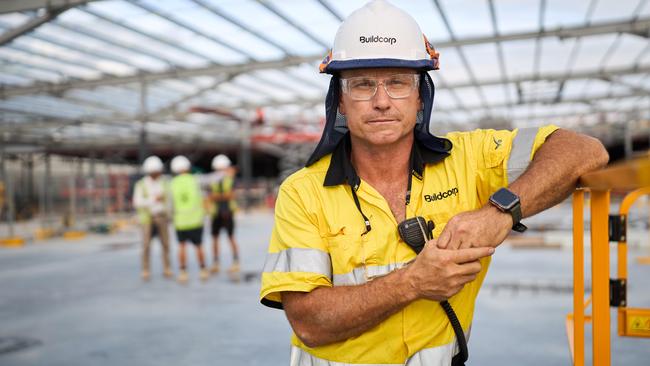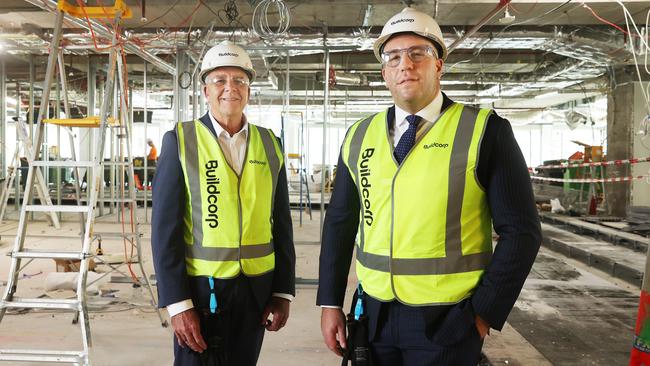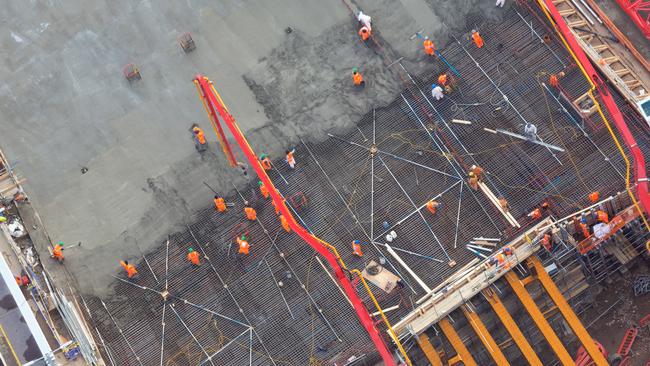Construction worker’s own battles behind push to get men to open up about mental health
They’re vital to our nation building, but statistics show construction workers are at an elevated risk of mental harm. These people are trying to change that.

For the first time in a long time, construction worker and father of four Kaine Thompson feels completely comfortable. But getting to this point has not been easy.
“From the age of 30, I really struggled with periods of mental health,” he says.
Long work hours, physically taxing work, and the responsibility he felt as the family breadwinner only compounded his bouts of depression and anxiety, leaving him with a sense of dread and overwhelming self-doubt.
“I’ve been with probably three different major companies and that was probably the reason why I left, because I’d just be doubting myself, doubting my abilities,” he says.
Four years ago, he began working for construction company Buildcorp. When those feelings of self-doubt returned, his colleagues noticed, and when he asked for help, support was offered. Within two days he was speaking with a counsellor and other on-the-job support services were activated. That had never happened at his other workplaces.
“They really helped me on the road back; I probably won’t look back now,” Mr Thompson says.
He didn’t know it at the time, but it was a life-changing intervention that would help him understand and identify his feelings and the pressures driving them, and provide him with the tools he needed to manage what he was experiencing.
Now he has become an advocate for better mental health within the construction industry.
“It’s not necessarily work that causes what you’re feeling, but if you’re not working in a happy environment you can get lost in it. A lot of people don’t speak on site, especially men. They’ve got to put their ‘tough men’ armour on, I guess. Hopefully, people can change being vulnerable on site. Opening up, that’s actually a good thing.”
Suicide is a leading cause of death for Australians aged 15-44, especially among men, according to the Australian Bureau of Statistics. Further research from Mates in Construction has found people working in the building sector are particularly over-represented in the data, with 190 Australians working in the construction industry taking their own lives every year,.
“There are real challenges in the broader community, but we also know that there is an elevated risk of suicide for those working in construction … with some workers finding it really difficult to discuss feelings and emotions,” Lifeline chief executive officer Colin Seery says.
“Tragically, the statistics are shocking and on average, every second day, a construction worker makes a decision to end their life. It’s critical that people know how, when and who to reach out to.”

To try to increase visibility of the problem, and the support systems available, Lifeline is teaming up with Buildcorp for a national fundraising event, Giving Day. For 24 hours, starting at 10am on Wednesday, April 2, Buildcorp will match every dollar donated by the public, capped at $250,000, to support Lifeline’s digital suicide prevention services.
The support comes as Australia is seeing a surge in demand for mental health services. The surge began during the pandemic, and has not abated. According to Lifeline, loneliness, relationship challenges, financial pressures and the cost of living are all contributing to personal stress.
“Last calendar year, we had eight of the 10 highest demand days in the 63-year history of Lifeline,” Mr Seery says.
“Society over the last number of years has had a sort of heightened level of anxiety. It really doesn’t take much to trigger people to need to reach out; it might even be a global event or geopolitical situation. There’s a lot happening and it’s really complex.”
As part of Giving Day, 19 Buildcorp sites will also down tools at lunchtime and host team lunches and conversations about mental wellbeing and how to seek help if needed.
Jordan Sukkar, the son of the company’s founders, is Buildcorp’s high-profile chief operating officer. The company also has a charitable offshoot, Buildcorp Foundation, designed to support mental health service.
“We’ve been very fortunate, both as a family but also as a business, over the last 35 years, and we feel that it’s our role to give back and to see what role we can play in helping the industry and those who are suffering from poor mental health,” Mr Sukkar says.
“The statistic which is the most horrifying is that every second day, a construction worker makes the decision to take their life. That’s just not good enough. That’s terrifying. And it’s critical that our construction workers and our team feel safe every day going to work.”
Part of Buildcorp’s strategies is to treat psychological safety in a similar way to how it treats physical safety. That includes encouraging workers to look out for one another and to openly talk about mental wellbeing.
“The nature of construction workers is blokey … they’re not known for talking. And so we’re making it more common or okay to talk about it and just trying to then weave it into our safety (practices) every single day,” Mr Sukkar says.
“We’re trying to make more of an emotional link as well, and asking workers why it’s important to them that they go home safe each day.”
Mr Sukkar challenged other workplaces to engage in similar activities to reduce stigma around mental health, describing it as an important responsibility for those wanting to be good social citizens.

For Kaine Thompson, it goes even deeper. His eldest son also works in construction, and making sure his four kids know it’s okay to ask for help is something he takes seriously.
“That’s the peak, for them to actually talk to me or their mum if there are any dramas or anything that can possibly turn into something more, and to know that if they just talk about it, it gets it off your shoulders,” he says.
Mr Thompson’s transparency around his own experience has also made him a trusted peer for those needing help both on and off the worksite.
“No one’s immune to it. It can happen to anyone at any time,” he says. “But I’m sort of more of a shoulder to lean on now, I guess. And I’m happy doing that. That’s my reward and hopefully my lingering legacy.”
Lifeline offers free and confidential support. If you need help, you can contact Lifeline on 13 11 14 or visit https://www.lifeline.org.au/ to access its digital support services.
To donate to Giving Day visit here.





To join the conversation, please log in. Don't have an account? Register
Join the conversation, you are commenting as Logout